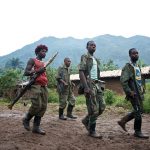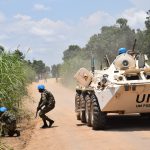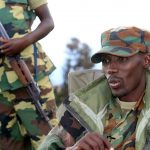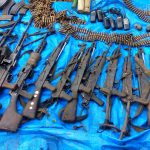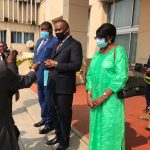Sitting at the bottom of an isolated valley, the women to the left and the men to the right of a wooden coffin, 500 people attend the funeral of Bonaventure Kinyegeria, a cow breeder killed by militiamen on October 6 near Minembwe in the eastern Democratic Republic of the Congo.
In broad daylight, the armed assailants stole the livestock of a Tutsi herdsman, victim of an armed conflict located on the Hauts-Plateaux of South Kivu. But a very political conflict which fuels old mistrust against Rwandans throughout the DRC.
The victim, 56, is a Congolese Tutsi “Banyamulenge”, a community with distant Rwandan origins.
“Before the Berlin conference (on the partition of Africa in 1885), we were already in the region,” says Sébastien, a general practitioner who departs from the outdoor ceremony to answer questions from us with six other notables.
“Congolese? And how!”
Congolese, then? “And how!”, Answers the small delegation. This does not go without saying for many Congolese, who consider them to be Rwandans, or agents of Rwanda, against the backdrop of land disputes, especially during the time of transhumance.
The murder of the Tutsi herder who was buried that day was not an isolated act. Since 2019, the Banyamulenge have claimed to be the target of militias from other Hauts-Plateaux communities (Babembe, Bafuliru and Banyindu) united with rebels from neighbouring Burundi (Red Tabara, FNL, Forebu).
“We have lost more than 300 people and 240,000 head of cattle,” said another notable, Pastor Joseph Harera, throwing unverifiable figures from an independent source.![]()
Faced with these attacks, two militias claim to defend the Banyamulenge, with the help of a colonel deserter from the Congolese army: “Twigwaneho” (self-defence) and “Ngumino” (we remain there in Kinyamulenge).
At the end of the funeral, the burgomaster and the notables return by motorbike to their stronghold of Minembwe, where the Banyamulenge claim to live on good terms with the Babembe and traders from Bukavu.
Minembwe is an enclave inaccessible by land. The road going up from Uvira and Fizi on the shores of Lake Tanganyika is impassable (bad weather, insecurity).
Apart from the UN helicopters, a small carrier plane from Bukavu lands two to three times a week on the improvised airfield in the middle of the vast pastures, at the foot of a mountain.![]()
Herds, breeders with slender silhouettes leaning on their sticks, wearing Borsalino-type costumes and hats, pretty brick houses, a market under a eucalyptus grove, no car: Minembwe looks like a little paradise lost in the middle of the steppes of ‘altitude. Yet it is this small peaceful town that ignites the spirits on social networks and in the media.
It is a minister who threw oil on the fire. During a visit on the spot, on September 28, Azarias Ruberwa pushed ahead to definitively grant Minembwe the powers of a full commune, for the benefit of the Banyamulenge.
“For our cows”
The Minister of Decentralization is himself Munyamulenge, and he is having a house built in the middle of the meadows after the airfield, slips an official from South Kivu.
Many Congolese saw in Minister Ruberwa’s decision nothing less than an attack on the territorial integrity of the DRC for the benefit of Rwanda.
However, Minembwe does not present any territorial continuity with Rwanda, the border passes dozens of kilometres as the crow flies northeast of the Hauts-Plateaux, between Bukavu and the Ruzizi plain.
But whatever. “If we leave Minembwe in the hands of these occupiers, tomorrow we will have no more countries. We would be the first people of Africa to be colonized by another people of Africa”, dared the opponent Martin Fayulu, in targeting Kigali.
Returning from the funeral, seated in his modest-sized office, the burgomaster Gadi Mukiza tries to understand why his small landlocked commune – 10km2 according to him – arouses so much passions in the four corners of the largest country in sub-Saharan Africa ( 2.3 million km2).![]()
“We are invaded by extremists. The backdrop to all this is the problem of nationality. It is said that the Banyamulenge are not full Congolese,” said the bourgmestre.
To clear up this “explosive” issue, President Félix Tshisekedi finally annulled the decision to “install” the commune of Minembwe. Instead, the head of state promised to install a commission of experts to redefine the territorial limits of the municipality.
It is the hour of evening peace in Minembwe, between setting sun and plumes of white smoke above the hills and plains. The temperature is falling quickly, The night will be cold, within 10 degrees.
“People from the outside are enforcing tribalism,” sighs a member of civil society. “The conflict is for our cows,” adds another. The theft of livestock would have resumed since the case of the municipality of Minembwe.





